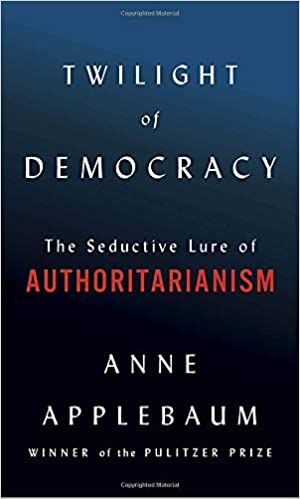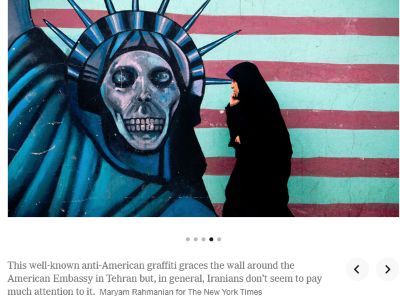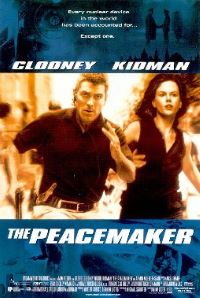
On August 24, 2020, NYU John Brademas Center and NYU Votes presented an online discussion between two ex-Republicans:
Anne Applebaum, Staff Writer at The Atlantic; Senior Fellow of International Affairs and Agora Fellow in Residence at the Johns Hopkins School of Advanced International Studies; author, Twilight of Democracy: The Seductive Lure of Authoritarianism
Moderator: Max Boot, Columnist at the Washington Post; Global Affairs Analyst for CNN; Jeane J. Kirkpatrick Senior Fellow in National Security Studies at the Council on Foreign Relations,
The topic was Applebaum’s new book:
In the United States as well as around the globe, democratic institutions have begun to deteriorate, while authoritarian movements continue to gain traction. Anne Applebaum, journalist and Pulitzer Prize-winning historian, argues that this trend should come as no surprise given the “seductive lure of authoritarianism.” In her new book, Twilight of Democracy, Applebaum focuses on the surrogates who enable autocracy.
What role do writers, academics, journalists, and other members of the cultural elite play in the ascent of nationalist rule? To what extent are these figures propelled by ideology versus their own financial or political gain? And what patterns emerge when we observe weakening democracies across the world from the U.S. to Poland?
During the conversation, Boot noted Applebaum’s fairly pessimistic view on democracy’s fate. The book definitively states that we are living through the twilight of democracy right now; there is no question mark in the title. She is not raising a question about the present, she is making a statement about it and it is a negative one.
In her response, Applebaum left some room for hope. She declared that she doesn’t do predictions. However if her book is a statement on the present twilight of democracy, then there is no real need of predictions: the dye is already cast. Applebaum considers it irresponsible for people in her generation to be pessimistic because that is not fair to the younger generations. Her book should be treated as a warning and not a prediction. Democracy could die but it is not inevitable that it will die. She asserts that decisions made now can affect the outcome. Her responses suggest the title should have ended with a question mark. I wonder who made the decision for the bolder more shocking title.
Boot followed up by inquiring from where does the threat to democracy emanate and what is the appeal of authoritarianism? Applebaum responded by raising the issue of uncertainty. People prefer something more predictable and certain for the future compared to the fragile and unstable world in which we live. As a result people are distressed over future.
Earlier in the discussion, Applebaum had mentioned two specific events leading to the current uncertainty particularly for conservatives like herself but not only for them. The first followed the fall of the Soviet Union in 1989. That was a triumphal moment for a generation of conservatives, a time of great optimism. Unfortunately the complacency in the 1990s afterwards was misplaced. The result was a loss of certainty in the inevitability of democracy.
She did not specifically refer to the current situation in this discussion. For the President of the United to be subordinate to the Russian leader who has a free hand to violate American presidential would have been a shocking concept after 1989 had it even occurred to anyone.
The second date was 1999 especially for Republicans but also for all Americans. The country went from celebrating what had happened in the decade just ending to a world where we often are no longer talking to each other. Along those lines, the article “Our Love Is Forever, as Long as We Vote the Same Way” in the Sunday Styles section of the NYT (August 30, 2020) reports on this very issue in a quite personal way. Dating companies now are obligated to include a line on political preferences given the impossibility of pro- and anti-Trump people to talk to each other. Once upon a time Mary Matalin and James Carville were the example of an unusual political couple. Now George and Kellyanne Conway are the mystifying couple. They recently had to take a timeout from politics for the sake of their children, their family, and their marriage AND THEY ARE MEMBERS OF THE SAME PARTY!
Applebaum added that in this new millennium people feel disappointed with what has happened for themselves, for their country, or both. Drawing on her own experience, she observes that the Polish thought the transformation of democracy would be better than it had been for themselves in their career and their country. She concluded that when you really feel disappointed, it can lead to radicalism. People become angry, convinced that there is nothing left to be done, that democracy has failed. Consequently disruptive change is needed.
There was more to their conversation than presented here. Still the major points are clear. The old order of the Cold War is over. Regardless of one’s position in that confrontation, it provided clearcut alternatives. You had a decision to make about where you stood. That decision provided meaning and purpose in life. Now everything seems up the air. Uncertainty dominates. Fear follows and that can lead to bad things. Very Bad things. Not to worry. Only I can save the country.
People deal with uncertainty in multiple ways. One way is to create certainty in the mind. For example, pilots train on simulators. They practice again and again. They learn how to recognize a dangerous condition. They learn what should be done in a perilous situation. They practice, practice, practice until it becomes so ingrained that that they can even land a plane ON the Hudson River if its engines are clogged with birds. The police practice and practice as well but not for dealing with the mentally ill, domestic disputes, or facing intensely emotional and overwrought people in a crowd.
At the end of the movie Hidden Figures, Katherine Johnson exhibits another form of mental preparation. After the successful landing of John Glen in a risky space flight, the Kevin Costner character asks her if we are ready to go to moon. She replies, “We’re already there.” She had seen the future in her mind again and again and was quite confident that it could be reached in the real world. The only question was when that world was going to catch up to her mind.
Imagining the future is one way of preparing for. We live in dystopian times so it is not surprising that our science fiction reflects these circumstances. We see a future of hate not hope, nightmares not dreams, conflict not peace. The more overwhelmed we are by the present, the more willing we are to accept drastic solutions, solutions that won’t work but which may give peace of mind for the moment without the use of drugs.
Science fiction like those simulators can help prepare us for the future. It has the possibility of generating hope. The one that did that in a way no other ongoing series did was Star Trek. The show was not just about special effects or entertaining stories. It expressed a confidence about boldly going where no one had gone before, about a confidence in facing the unknown, about a willingness even eagerness to engage the future. All these attributes and desires are lacking in a world where we have the dark carnage relentlessly promulgated by the Trumpicans and the relentlessly toppling of our past by the Woke.
We are not a Starship Enterprise country today. We cannot communicate with each other yet alone live with each. The intensity of distrust and hate ratchets ever upward making our time the twilight of democracy. Kirk’s hero was Lincoln, a name used and abused today by people who are full of malice and reject America’s vision as the last best hope of humanity. Neither candidate seeks to inspire us; we are a country without vision. Still even people who are not science fiction fans know the message of Star Trek. I suspect they yearn for a candidate who can overcome our fear of fear itself with the message that best is yet to come.





